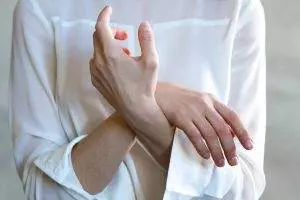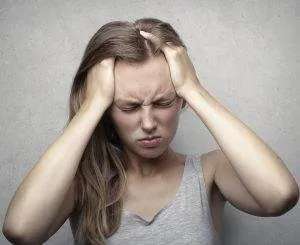-
 Art of Wellness Acupuncture & Traditional Chinese Medicine (TCM)11704 Wilshire Blvd, Suite 295, Los Angeles, CA, 90025
Art of Wellness Acupuncture & Traditional Chinese Medicine (TCM)11704 Wilshire Blvd, Suite 295, Los Angeles, CA, 90025
myartofwellness@gmail.com310-451-5522 Office Hours
MonClosedTue7:30 am --4 pmWed7:30 am --4 pmThu7:30 am -- 4 pmFri7:30 am -- 4 pmSat7:30 am -- 4 pmSunClosedOur office opens from Tuesdays to Saturdays 7:30 am to 4 pm, will be closed on Memorial day, Independent day, Labor day, Thanksgiving day, Christmas and New year.
-
Recent Posts
- How to Treat Nerve Pain With Acupuncture and TCM
- How to Treat Watery Eyes With Acupuncture and TCM
- How to Treat Ovarian Cysts With Acupuncture and TCM
- How to Treat Dystonia With Acupuncture and TCM
- Can Acupuncture Help Bad Breath?
- How to Treat Atopy with Acupuncture and TCM
- Plantar Fasciosis Treatment With Acupuncture and TCM
- How to Protect Yourself When Air Quality Is Poor
- How to Treat Spinal Headache With Acupuncture and TCM
- How to Treat Sarcoidosis With Acupuncture and TCM
- How to Treat Flu With Acupuncture and TCM
- Chinese New Year 2025 Year of the Snake
- How to Treat Lumbar Stenosis With Acupuncture and TCM
- How to Treat Wrist Pain With Acupuncture and TCM
- How to Treat Cervical Radiculopathy With Acupuncture and TCM
- How To Treat Frozen Shoulder With Acupuncture and TCM
- Sign up to receive news and updates and get my free report:“The Top 10 Reasons to Try Acupuncture”

May 2025 M T W T F S S 1 2 3 4 5 6 7 8 9 10 11 12 13 14 15 16 17 18 19 20 21 22 23 24 25 26 27 28 29 30 31
Skin
How to Treat Edema With Acupuncture and TCM
By Qineng Tan, L.Ac., Ph.D. and Xiaomei Cai, L.Ac., Ph.D.

Swollen feet and ankles? Fluid retention in legs? These are signs of edema. Acupuncture and TCM offer natural diuretic herbs and alternative treatment for swelling in legs and feet.
Edema refers to when excess fluid in body tissues, or water retention, leads to swelling. Edema most commonly causes swollen ankles and swollen feet. But edema can occur in many parts of the body.
Blood vessels have tiny valves that work to push blood from the lower body back up to the heart. When this process isn’t working properly, blood and other fluids will gather in the legs and cause swollen feet and ankles.
Edema causes puffiness under the skin, and when you press on the skin, it leaves an imprint. The skin may be shiny and stretched because of water retention.
Other edema symptoms can include a feeling of heaviness in the legs, and a swollen belly or distended abdomen.
Everyone experiences edema once in a while; for example, after a long airplane flight, which causes fluids to pool in the legs and feet, or the day after eating particularly salty foods, which can cause water retention. Edema is also common during pregnancy, when increased blood volume and pressure from the growing uterus can cause edema in the legs.
Occasional edema can often be prevented or remedied by reducing salt intake, drinking more water, and wearing compression garments.
Some health conditions can cause edema, in which case, both the underlying issue and the edema itself need to be addressed.
Acupuncture and Chinese herbs can help relieve swollen ankles and feet due to water retention, as well as helping to address the root cause of edema.
Causes of Edema
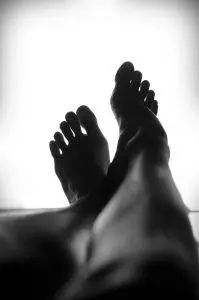
Edema can happen when a person stays in one position for a long time and fluids build up in the lower body due to gravity. This type of swelling can be helped by getting up and moving around regularly and/or wearing compression socks that prevent water retention from causing swollen ankles and feet.
Cardiovascular issues having to do with heart function or the health of blood vessels can cause edema. When the heart doesn’t pump blood effectively, it can cause fluid buildup in the legs, ankles, and feet. Venous insufficiency, or weakness in the veins, can prevent blood from being pushed back to the heart properly, which leads to varicose veins and blood buildup in the legs.
Kidney disease and liver disease can contribute to edema. Damaged kidneys are less able to remove excess fluid, leading to swelling. Conditions like cirrhosis can increase pressure in blood vessels and reduce proteins that keep fluid in the bloodstream, causing edema.
Blocked or damaged lymph nodes can prevent lymph fluid from draining well, causing localized edema. This is known as lymphedema. Lymphedema can be related to cancer treatments, when lymph nodes are removed.
People may experience edema after a stroke or cardiac event like a heart attack.
Side effects from some drugs, including those for high blood pressure and corticosteroids, can cause fluid retention.
Conditions such as cellulitis or arthritis can cause inflammation and localized swelling.
When there are underlying conditions like cirrhosis, kidney problems, and vascular issues, they must be addressed in order to resolve the edema.
Treatment for Swollen Legs and Feet
Conventional medical treatments for edema typically focus on addressing the underlying cause and managing symptoms. Typical medical treatment for edema may include:
- Diuretics to help the body expel excess fluid through urine.
- Compression stockings to help reduce swelling by promoting fluid movement in the legs.
- Elevating the affected limbs above the level of the heart can help reduce swelling.
- Lowering sodium in the diet can help prevent fluid retention.
- Regular exercise to improve circulation and help reduce swelling.
- Addressing heart, kidney, or liver issues can help manage edema.
Using diuretic medications may seem to alleviate swelling in the short term, but these drugs create a kind of dependency. As soon as a person stops taking the diuretics, the water retention will return.
Chinese herbal formulations can act as natural diuretics, while addressing the root cause of edema.
By integrating acupuncture and TCM into your treatment plan, you may find a holistic approach that addresses not only the symptoms of edema but also its cause, providing lasting relief from edema swelling.
Can Acupuncture Help Edema?

TCM theory for the treatment of edema goes back over 2000 years. The Yellow Emperor wrote about edema treatment in his medical text before 100 B.C., describing the disruption of fluid movement in the body. In the second century A.D., another well-known Chinese doctor Zhang Zhong-Jing detailed treatments for edema with herb formulas, which are still considered classics today.
Edema can be related to imbalances in Yin and Yang. Yin edema affects the spleen and kidneys, while Yang edema affects the spleen and lungs. Yin edema symptoms tend to start in the lower body, with swollen feet and ankles, while Yang edema symptoms tend to start in the upper body, with the tendency to have tight, shiny skin.
According to TCM, the organ systems of the Spleen, Kidneys, and Lungs must be balanced in order to restore proper functioning of fluid metabolism. An acupuncture treatment protocol would be directed towards clearing wind, heat, dampness, and other pathogenic forces, while balancing Yin and Yang, and regulating Qi and Blood.
Different pathologies of edema can be described by TCM diagnoses, including:
- Blood stasis
- Qi stagnation
- Damp heat
- Heat toxins
- Wind-cold or Wind-heat in the lungs
Recent research shows that ancient herb formulas can help regulate fluids and have a positive effect on vascular function.
Moxibustion, a TCM modality that involves warming acupoint areas by burning mugwort herb near the skin, is often used to help relieve edema. Moxa treatment can help improve blood flow by warming and dispersing dampness and phlegm and invigorating the spleen and kidneys.
One study of patients suffering from swelling in legs and ankles showed that moxibustion helped relieve swelling in the legs.
Breast cancer treatment often involves radiation treatment that affects the lymph nodes, or the removal of lymph nodes, which can lead to lymphedema. This type of lymphedema often affects one arm, or both arms. It can also affect other parts of the body.
One study involved using acupuncture treatment twice a week to help relieve lymphedema after cancer treatment. More than half of the patients experienced a significant improvement in lymphedema, as measured by arm circumference. The conclusion was that acupuncture is a safe treatment that can help reduce swelling.
Acupuncture treatment improves blood flow and the movement of fluids in general, while nourishing the kidneys and spleen. Moxibustion can be used to further stimulate the flow of blood and Qi.
Acupuncture Near Me for Edema in West Los Angeles
Edema is a common problem, but it requires an individualized approach, as it can have many different root causes. Experienced acupuncture practitioners like Dr. Tan and Dr. Cai at Art of Wellness in Westwood, CA can help patients find relief from edema swelling and water retention in legs through a combination of acupuncture, moxa, herbs, and personalized nutrition counseling.
*This article is for education from the perspective of Traditional Chinese Medicine only. The education provided by this article is not approved by FDA to diagnose, prevent, treat and cure human diseases. It should not stop you from consulting with your physician for your medical conditions. Traditional Chinese Medicine is based on Qi, which is an invisible force that usually cannot be observed by modern science. Because science focuses on testing ideas about the natural world with evidence obtained through observation, these aspects of acupuncture can’t be studied by science. Therefore acupuncture and Chinese herbs are often not supported by double-blind, randomized trials, and they are considered alternative medicine therapies in the United States.
How to Treat Pruritus With Acupuncture and TCM
By Xiaomei Cai, L.Ac., Ph.D. and Qineng Tan, L.Ac., Ph.D.
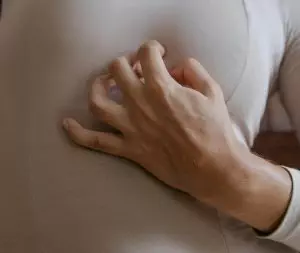
Itchy skin, hives all over the body, or skin rashes that itch? Pruritus, commonly known as itching, is an irritating and persistent condition that affects many people. Acupuncture and TCM herbs can offer a holistic approach to alleviate itching.
Pruritus is simply a medical term that means “itching,” or that feeling that you need to scratch your skin. It can refer to itchy skin on one part of the body, or systemic itching that feels like it moves around or affects the whole body. The sensation can be mild, even ticklish, or painful and constant to the point that it is debilitating.
The sensation of itching all over body can significantly impact one’s quality of life, as it can be painful, distracting, and make it difficult to concentrate, relax, or sleep.
Persistent itching requires treatment that takes many possible underlying factors into consideration. This is why acupuncture and TCM can be a good alternative treatment for pruritus.
What Causes Pruritus?
Pruritus can stem from various causes. It can be a primary condition, arising due to a skin problem or skin allergy, such as:
- Atopic dermatitis
- Dermatitis herpetiformis
- Psoriasis
- Eczema
- Hives, urticaria
- Folliculitis
- Dry skin
- Hemorrhoids
- Head lice infestation
Pruritus can also be caused by many other conditions, such as nerve damage, renal disorders that require dialysis, blood diseases like polycythemia vera, hepatitis, liver cirrhosis, infections like chicken pox and shingles, HIV, thyroid disorders, MCAS, pregnancy and perimenopause.
Top 10 Pruritus Causes
Because the sensation of itching, like that of pain, can be influenced by so many factors, there are many possible causes of pruritus. Itchy skin can be caused by a wide variety of conditions, including:
- Allergic Reactions: Common allergens include certain foods, medications, and insect stings or bites. Immune system disorders like MCAS can cause pruritus.
- Dermatitis: Conditions like atopic dermatitis (eczema) and contact dermatitis can lead to persistent itching.
- Skin Infections: Bacterial, viral, and fungal infections can cause itching.
- Dry Skin (Xerosis): Often exacerbated by environmental factors, dry skin can cause itching.
- Internal Diseases: Liver disease, chronic kidney disease, thyroid problems, and certain cancers can cause systemic itching. Chronic kidney disease that require dialysis treatment, in particular, can cause a condition known as Uremic Pruritus.
- Nervous System Disorders: Conditions such as multiple sclerosis, pinched nerves, and postherpetic neuralgia can lead to pruritus. Brachioradial pruritus, for example, is a condition in which irritation of the cervical nerves (C5-C8) causes itching on one or both of the the upper arms.
- Mental Health Issues: Stress, anxiety, and obsessive-compulsive disorder can manifest with itching.
- Pregnancy: Some women experience pruritus during pregnancy due to hormonal changes.
- Perimenopause: Some women experience pruritus during perimenopause and menopause due to a reduction in estrogen levels.
- Reactions to medications: Many drugs can cause pruritus as a side effect, including antibiotics like penicillin, amoxicillin, erythromycin, blood pressure medications, statins, or cholesterol medications, analgesics like aspirin, and tricyclic antidepressants.
Treatment for Pruritus
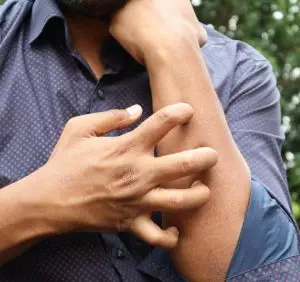
Conventional medicine typically treats pruritus by trying to find and address the underlying cause, while using medications to alleviate the symptom of itching. This may include topical treatments like over-the-counter or prescription creams and ointments that contain corticosteroids, menthol, or capsaicin to soothe the skin and reduce inflammation. These creams may help relieve localized itching for a time, but they cannot do much to control widespread, systemic itching.
Antihistamines, such as diphenhydramine or cetirizine, may be prescribed to reduce allergic reactions and relieve itching. These can be helpful in some acute cases of pruritus, but again, they do not resolve the problem of chronic itching. Overall, most people with chronic pruritus do not get adequate relief from antihistamine treatment for itching.
For severe itching, oral corticosteroids or immunosuppressants may be prescribed to reduce inflammation and immune response.
TCM and acupuncture can be an effective alternative or adjunct treatment for itching, as TCM addressed both underlying conditions and the symptoms of itchy skin.
Can Acupuncture Help Pruritus?
TCM methods like acupuncture and moxibustion have been used for over 2000 years to help relieve itchy skin conditions and systemic pruritus. Now, scientific research is beginning to show that Chinese medicine is an effective alternative treatment for itching.
The mechanisms that cause the sensation of itching often stem from the brain and the peripheral nervous system. Acupuncture has been shown to have an effect on the nervous system, and specifically, to help reduce the activation of the itch response in the brain.
Itching responses are also activated by the behavior of mast cells, like cytokines. Acupuncture, particularly electroacupuncture, has been shown to help regulate the activity of cytokines, which can help reduce inflammation and sensation.
Acupuncture is well known, now, to help relieve pain by stimulating receptors in the brain. This same action can help to reduce itchy sensations, as well as pain.
The chemical and mechanical activations that cause itching can lead to a chronic problem referred to as the “itch-scratch vicious cycle,” which occurs because of a neural loop in the spinal cord. Acupuncture can potentially help to disrupt this chronic loop of activations that causes the urge to scratch.
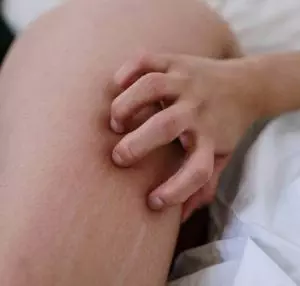
Acupuncture and TCM herbal remedies can also help to clear up skin conditions that are directly causing itching, and can help to address deeper underlying conditions, such as liver and kidney ailments, that can be the secondary cause of systemic itching.
Uremic pruritus, which is associated with dialysis treatment for chronic kidney disease or renal failure, affects many people. This type of pruritus can cause sleep problems and affect patients on a daily basis and is believed to be caused by severe dryness of the skin, along with sweating, and chronic inflammation. It may also be related to opioid receptors and inappropriate nerve signaling that triggers the release of cytokines. A review of studies about acupuncture treatment for chronic kidney disease suggests that TCM is highly effective for reducing itching related to uremic pruritus.
One specific study looked at patients undergoing dialysis who were given acupressure treatment. The conclusion was that acupressure was both helpful for relieving itching and cost effective as a treatment alternative.
Acupuncture treatment has an impact not only on the autonomic nervous system, but also on histamine release, and studies have shown that acupuncture is more effective at controlling histamine-related itching than many antihistamine medications.
One study done with 16 patients suffering from brachioradial pruritus (itching on the upper arm/s) found that the majority experienced total resolution of their itching, while the remaining patients experienced partial relief of itching.
Acupuncture Near Me for Pruritus in West Los Angeles
Acupuncture can be beneficial for itchy skin conditions like hives, dermatitis, and rashes. During pregnancy and perimenopause, acupuncture can help balance hormones to relieve itching and insomnia. Acupuncture can also help relieve anxiety, PTSD and panic disorders that can sometimes exacerbate itching sensations. Liver problems, kidney problems, and side effects of cancer treatment can all be addressed with TCM, which may help relieve persistent pruritus.
*This article is for education from the perspective of Traditional Chinese Medicine only. The education provided by this article is not approved by FDA to diagnose, prevent, treat and cure human diseases. It should not stop you from consulting with your physician for your medical conditions. Traditional Chinese Medicine is based on Qi, which is an invisible force that usually cannot be observed by modern science. Because science focuses on testing ideas about the natural world with evidence obtained through observation, these aspects of acupuncture can’t be studied by science. Therefore acupuncture and Chinese herbs are often not supported by double-blind, randomized trials, and they are considered alternative medicine therapies in the United States.
How to Treat MCAS With Acupuncture and TCM
By Xiaomei Cai, L.Ac., Ph.D. and Qineng Tan, L.Ac., Ph.D.

Shortness of breath, dyspnea? SIBO or fungal infections? Sensitive to smells? Signs of orthostatic low blood pressure? Itchy skin rash or hives? Musculoskeletal pain, joint pain? These can be some of the many different MCAS symptoms. Acupuncture and TCM can offer alternative treatment for MCAS, or mast cell activation disorders.
Mast Cell Activation Syndrome (MCAS) is a complex and often underdiagnosed condition characterized by the inappropriate activation of mast cells, which are immune cells involved in allergic and inflammatory responses throughout the body.
In short, mast cells are what cause people to have an allergic reaction to something. When mast cells encounter an allergen (or sometimes a medication, infection, or insect venom), antibodies inside them surface and send out “mediators.” Mast cells can produce hundreds of different types of mediators. These include histamine, leukotrienes and cytokines.
In MCAS, mast cells release excessive amounts of mediators, leading to a wide range of symptoms affecting various organ systems throughout the body. There are so many different mediators that science is not yet able to pinpoint which mediators may be causing which symptoms, in many cases.
This systemic activation of mast cells can occur spontaneously or in response to triggers such as stress, exercise, medications, infections, or environmental factors.
The symptoms of MCAS can vary widely among individuals and may mimic those of other conditions, making diagnosis challenging. There are five categories of MCAS symptom, affecting different parts or systems of the body:
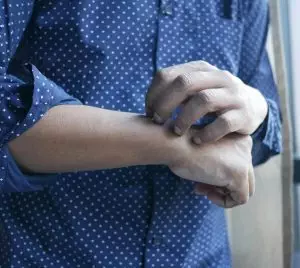
Skin-related MCAS Symptoms:
Itching (pruritus)
Hives (urticaria)
Flushing or redness of the skin
Rashes or eczema-like lesions
Swelling (angioedema), particularly of the face, lips, tongue, or throat
Gastrointestinal MCAS Symptoms:
Abdominal pain or cramping
Nausea and vomiting
Diarrhea or constipation
Acid reflux or heartburn
Bloating or abdominal distension
Respiratory MCAS Symptoms:
Wheezing or difficulty breathing (dyspnea)
Chest tightness or pain
Coughing or throat clearing
Nasal congestion or runny nose
Sneezing or postnasal drip
Cardiovascular MCAS symptoms:
Rapid or irregular heartbeat (palpitations)
Low blood pressure (hypotension)
Fainting or near-fainting episodes (syncope)
Fluctuations in blood pressure upon standing (orthostatic hypotension)
Raynaud’s phenomenon (abnormal blood vessel spasm in response to cold or stress)
Neurological MCAS symptoms:
Headaches or migraines
Dizziness or lightheadedness
Cognitive dysfunction or brain fog
Anxiety or panic attacks
Fatigue or malaise
These symptoms can vary in severity and may occur intermittently or chronically.
What Causes MCAS?
Medical science is unclear about the underlying cause of MCAS. Mastocytosis is a different mast cell disorder, in which people have an elevated number of mast cells. However, with MCAS, people have a normal number of mast cells; they just behave in an exaggerated manner when triggered.
MCAS is “primary” when there is a particular genetic mutation, which may happen due to mastocytosis or monoclonal mast cell activation syndrome (MMAS,) in which there is a clonal line of mast cells.
In some cases, when a person also has a diagnosed autoimmune disorder, allergy, or infection the MCAS is considered “secondary,” meaning that the overactive mast cell activity may be stemming from that other primary condition.
A diagnosis of “Idiopathic MCAS” indicates that neither of the above factors is present.
MCAS can begin at any point in a person’s life, including during childhood.
MCAS Treatment
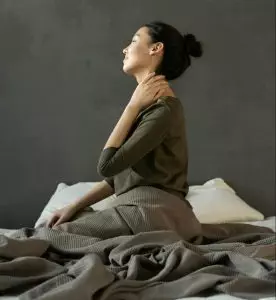
Treatment for Mast Cell Activation Syndrome (MCAS) in Western medicine typically involves a combination of medications and lifestyle modifications aimed at stabilizing mast cells and alleviating symptoms.
Antihistamines, such as H1 receptor blockers (e.g., loratadine, cetirizine) and H2 receptor blockers (e.g., famotidine, ranitidine), are commonly prescribed to reduce the effects of histamine released by mast cells.
Mast cell stabilizers, such as cromolyn sodium, can help prevent the release of inflammatory mediators from mast cells and may be used as preventive therapy. In cases of severe or refractory symptoms, corticosteroids or leukotriene inhibitors may be prescribed to suppress the immune response and reduce inflammation.
Medications to manage specific symptoms, such as gastrointestinal distress or cardiovascular symptoms, may be recommended.
Lifestyle modifications, such as avoiding known triggers, managing stress, and following a healthy diet, may also play a crucial role in managing MCAS symptoms.
It’s important for individuals with MCAS to work closely with their healthcare providers to develop a personalized treatment plan. Acupuncture and TCM can provide adjunct treatment for MCAS that address each patient’s unique symptoms and needs.
Can Acupuncture Help MCAS?
One of the central concepts of Traditional Chinese Medicine, which dates back many centuries, is that of the meridian system. The 12 meridians are channels of energy, or Qi, that flow throughout the body. Along the meridians are many acupoints: spots where Qi is activated when thin acupuncture needles or acupressure are applied to them.
But do the meridians exist as physical entities, or are they metaphorical?
Scientific research in the twentieth century sought to explain the various phenomena produced by the activation and manipulation of acupoints. It was found that both blood vessels and nerves are located near the acupoints in greater concentration than in other areas of the body. These studies suggested that acupuncture treatment functions through the vascular and nervous systems.
Later, further studies showed that acupuncture has effects on the production and releasing of hormones, such as endorphins, which has a analgesic effect of reducing pain.
The sensations that people feel as a result of acupuncture treatment cannot be fully explained by saying they are related to blood vessels, nerves, or hormones. Further questioning continued, asking if other cells or tissues could also be involved in how acupuncture works.
One female scientist, researcher, and professor in China, Jimei Song, hypothesized that activity around acupoints may be related to mast cell activation. This idea was Song’s Mast Cell Theory of Acupuncture (now called Song’s MC Theory for short, originally published in the Liaoning Journal of Traditional Chinese Medicine (TCM) in 1977.

Studies suggest that when an acupuncture needle penetrates the skin, mast cells are released, which then in turn, affect the blood vessels and nerves, leading to both sensations experienced by the patient in the moments, and systemic effects on the release of histamines, serotonin, and other chemicals than go on to create systemic effects. This is now considered a milestone in TCM research.
Acupuncture has been shown to have a positive effect on histamine response. Specific Chinese herbal formulas have also been shown to be effective in dampening mast cell activation. Compounds found in some herbs can help inhibit the production of cytokines.
An acupuncturist is able to address the problem both at its root, and help take care of the wide variety of symptoms a person may be experiencing. Acupuncture treatment can help relieve problems like itchy skin rash, sensitivities, orthostatic low blood pressure, and joint pain, all in one treatment session. A personalized herb formula can be prescribed to suit each individual patient.
Acupuncture Near Me for MCAS in Los Angeles
MCAS can mimic many other conditions and be difficult to diagnose and treat. This is what makes acupuncture, herbs, and moxibustion excellent modalities for helping to relieve MCAS symptoms such as: dizziness, headaches, musculoskeletal pain, insomnia, anxiety, hives, GERD, SIBO, IBS, interstitial cystitis bladder pressure, and more. Acupuncture and TCM can offer an adjunct or alternative treatment for MCAS symptoms.
*This article is for education from the perspective of Traditional Chinese Medicine only. The education provided by this article is not approved by FDA to diagnose, prevent, treat and cure human diseases. It should not stop you from consulting with your physician for your medical conditions. Traditional Chinese Medicine is based on Qi, which is an invisible force that usually cannot be observed by modern science. Because science focuses on testing ideas about the natural world with evidence obtained through observation, these aspects of acupuncture can’t be studied by science. Therefore acupuncture and Chinese herbs are often not supported by double-blind, randomized trials, and they are considered alternative medicine therapies in the United States.
How to Treat Raynaud’s Syndrome With Acupuncture and TCM
By Qineng Tan, L.Ac., Ph.D. and Xiaomei Cai, L.Ac. Ph.D.

Fingers numb? Numbness in fingers and toes? Fingers turning white, poor circulation in fingers, cold fingers and toes? Raynaud’s disease, or Raynaud’s phenomenon, causes poor circulation in the extremities due to constriction of the blood vessels, usually triggered by cold weather or stress. Acupuncture can help relieve Raynaud’s disease symptoms.
Raynaud’s disease is a condition characterized by occasional narrowing of the blood vessels, primarily in the fingers and toes. The small arteries that supply blood to the skin of the fingers and toes (and sometimes, to the ears and the tip of the nose) become constricted in cold conditions.
Raynaud’s syndrome causes the tips of the fingers and/or toes to turn white due to the lack of circulation, and there may be numbness in fingers or tingling in toes. A “Raynaud’s attack” or episode lasts until the person warms up, at which point, there may be a burning sensation, and the affected skin may flush and turn red as blood flow returns.
Raynaud’s can occur in two forms: primary and secondary.
Primary Raynaud’s, also called Raynaud’s disease, is the more common form and isn’t usually related to another medical condition. Raynaud’s is considered to be an exaggerated response to cold, emotional stress or anxiety, leading to spasms in the small arteries.
People with primary Raynaud’s phenomenon usually begin to experience symptomatic episodes during their teenage years. Women are more likely to have Raynaud’s.
Secondary Raynaud’s is less common but more serious. It is associated with other diseases, typically autoimmune diseases or connective tissue disorders, like scleroderma, rheumatoid arthritis, thyroid disorders, or lupus.
Secondary Raynaud’s can be linked to conditions that directly damage the arteries or affect blood flow, like carpal tunnel syndrome. In these cases, it is considered a symptom rather than a separate condition.
Raynaud’s Syndrome Causes
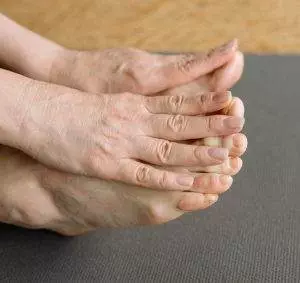
For most people with Raynaud’s syndrome, there is probably a combination of genetic, physiological, and environmental factors at play.
Vascular abnormalities, or dysfunction in the blood vessels, involving excessive narrowing (vasospasm) and poor dilation in response to stimuli, may be involved.
Overactivity of the nerves controlling the blood vessels (sympathetic nervous system) may cause spasms.
Raynaud’s can tend to run in some families. If someone is already susceptible, then the numbness in fingers and toes may be triggered by cold temperatures, or a stressful situation. Smoking cigarettes can also cause Raynaud’s symptoms.
In secondary Raynaud’s, underlying autoimmune conditions can lead to inflammation and damage to blood vessels.
An injury to one of the limbs, like a broken wrist, or damage to the tissues from frostbite, could also trigger Raynaud’s phenomenon.
Some prescription medications, such as beta blockers, ADHD medications, medications for migraine headaches, and even some cold and flu medicines, could cause Raynaud’s symptoms.
Acupuncture treatment can help to relieve Raynaud’s syndrome symptoms and also address the underlying condition that may cause Raynaud’s.
Top 10 Raynaud’s Disease Symptoms
Raynaud’s symptoms may show up differently for each person. Symptoms of Raynaud’s disease can vary in severity and may include:
- Skin changes color: pallor (pale skin, white skin, or yellow skin) in the affected fingers or toes during an episode
- In rare cases, Raynaud’s phenomenon can affect other areas, such as the nose, ears, and lips.
- Some people may experience Raynaud’s in their nipples, which can cause a severe throbbing pain.
- Bluish discoloration (Cyanosis) as blood flow decreases
- Affected areas feel cold and/or numb during an episode
- Throbbing or tingling in the fingers or in the toes
- Sensitivity to cold temperatures, leading to more frequent episodes in cold weather.
- In severe cases, recurrent or persistent episodes of reduced blood flow can lead to skin sores or ulcers, particularly on the fingertips or toes.
- Changes in the texture and color of the nails, including nail beds that turn white and then blue during an episode.
- Some individuals may experience joint pain, particularly if there is an underlying connective tissue disorder.
Emotional stress, anxiety, or rapid changes in temperature can trigger Raynaud’s symptoms.
Raynaud’s disease is generally considered a benign condition, but repeated episodes can lead to more serious problems, like skin sores, chilblains, or even gangrene, which can cause permanent damage to tissues.
Raynaud’s Syndrome Treatment

Diagnosis of Raynaud’s disease may involve a test called nailfold capillaroscopy. This is a non-invasive test that allows the doctor to see the capillary size and action in the tips of the fingers and nail bed. This can help to determine whether the person has Primary Raynaud’s, or may have a connective tissue disorder, like lupus or Sjogren’s syndrome.
The standard medical treatment for Raynaud’s phenomenon aims to manage symptoms, improve blood flow, and prevent complications. While there is no cure for Raynaud’s, various medications and lifestyle modifications can be employed to alleviate symptoms and enhance circulation.
Medications that relax and widen blood vessels, known as vasodilators, are commonly prescribed. Calcium channel blockers, such as nifedipine, are often used to help dilate the small blood vessels in the extremities, reducing the frequency and severity of Raynaud’s episodes.
Phosphodiesterase inhibitors like sildenafil (which is also commonly prescribed to help erectile dysfunction, ED) can sometimes be beneficial in promoting blood vessel dilation and improving blood flow.
In some cases, topical nitroglycerin cream may be prescribed to increase blood flow to the affected areas.
Endothelin receptor antagonists, such as bosentan, may be considered in cases where blood vessel constriction is severe. These medications target endothelin, a substance that can cause blood vessels to narrow.
Antiplatelet agents like aspirin may be recommended to reduce the risk of blood clots and improve blood circulation.
If Raynaud’s is secondary to another condition, treating the underlying cause is crucial. For example, if it is associated with an autoimmune disorder, immunosuppressants might be considered.
Lifestyle changes play a significant role in managing Raynaud’s symptoms. Patients are typically advised to dress warmly.
Quitting smoking is strongly recommended, as smoking constricts blood vessels.
Can Acupuncture Help Raynaud’s Syndrome?
TCM has acknowledged Raynaud’s phenomenon as a condition of severe cold in the limbs for centuries. According to TCM theory, a deficiency of Qi and blood circulation is the root cause of Raynaud’s symptoms. In TCM, we consider that Qi (life force energy) and blood work together; Qi moves the blood throughout the body, and blood carries the Qi throughout the body.
In TCM, we are always looking at both external factors and internal factors that contribute to a condition. In the case of Raynaud’s disease, cold acts as a pathogenic factor that can be already present inside the body, and then, when a person is exposed to cold temperatures as an external factor, this triggers an extreme reaction.
So, in many cases, a person suffering from Raynaud’s is already dealing with too much cold and poor blood circulation. Herbs can be used to help warm the body internally and increase blood flow.
Some people develop Raynaud’s symptoms in response to stress. In this case, the liver may be involved. In TCM, the liver is associated with strong emotions, and when the liver is distressed, it can trigger muscular contractions that squeeze the blood vessels, restricting blood flow. In these cases, we will use herbal formulas and acupuncture points to help restore balance in the liver.
When there is an autoimmune disease also present, such as scleroderma or lupus, then there may also be blood stasis, and a thickening of the blood and tissues. TCM can address those conditions at their roots, as well.
An acupuncturist will make careful observations about how each individual is experiencing Raynaud’s symptoms, and address it according to the pattern presenting.
Top 3 Tips for Managing Raynaud’s Syndrome Symptoms

You can help prevent Raynaud’s attacks by keeping your whole body warm, especially your hands and feet.
- Protect your hands and feet. Wear mittens or gloves, thick socks and lined boots, and use hand and foot warmers in cold weather. Consider wearing gloves or oven mitts when reaching into the refrigerator or freezer.
- Exercise regularly, both to stimulate healthy blood circulation, and to help manage stress levels.
- If hands and/or feet do begin to feel cold or numb, take action to warm them up immediately by wiggling them, running them under warm water, massaging them, or putting your hands in your armpits or against your abdomen under your clothing.
Acupuncture Near Me for Raynaud’s Syndrome in West Los Angeles
It is important to address Raynaud’s disease to avoid damage to the nerves and skin tissue in your extremities, and to be sure whether or not Raynaud’s symptoms are related to an underlying autoimmune disorder. The acupuncturists at Art of Wellness Acupuncture in West L.A. have over 35 years of experience helping people with autoimmune conditions, circulatory problems, and nerve pain and tingling. The combination of herbs and acupuncture treatment can help relieve Raynaud’s phenomenon symptoms and address any autoimmune disease or nerve conditions.
*This article is for education from the perspective of Traditional Chinese Medicine only. The education provided by this article is not approved by FDA to diagnose, prevent, treat and cure human diseases. It should not stop you from consulting with your physician for your medical conditions. Traditional Chinese Medicine is based on Qi, which is an invisible force that usually cannot be observed by modern science. Because science focuses on testing ideas about the natural world with evidence obtained through observation, these aspects of acupuncture can’t be studied by science. Therefore acupuncture and Chinese herbs are often not supported by double-blind, randomized trials, and they are considered alternative medicine therapies in the United States.
How to Treat Autoimmune Disorders With Acupuncture and TCM
By Qineng Tan, L.Ac., Ph.D. and Xiaomei Cai, L.Ac., Ph.D.

Autoimmune disorders are on the rise, and they can be difficult to diagnose and treat. Acupuncture and TCM offer relief from autoimmune disease symptoms, while addressing the root of what might cause autoimmune disorders.
What is an autoimmune disease? The human immune system creates a variety of antibodies that are designed to fight off bacteria, viral infections, cancer cells, and toxins. An autoimmune disorder occurs when your body’s immune system malfunctions in some way and creates antibodies that attack healthy cells instead of dangerous ones. Different autoimmune disorders cause damage or dysfunction in different organs or systems of the body.
A recent study, based in the UK, looked at 19 prevalent autoimmune diseases and found that autoimmune disorders affect about one in ten people (13% of women and 7% of men).
Another study published in Arthritis and Rheumatology a few years ago, found that the most common biomarker of autoimmune disease—a high number of antinuclear antibodies (ANA)—has risen significantly across the US population, and particularly among certain groups, including adolescents, and people over 50. This study suggests that the chance of developing an autoimmune disorder is higher than ever.
Medical science has named over 80 different types of autoimmune diseases, but the understanding of what causes autoimmune disorders is still murky. Many people with autoimmune disorders go undiagnosed, and even when doctors are able to diagnose an autoimmune condition, there is no cure.
Autoimmune disorders do tend to run in families, which suggests that some people are more likely genetically disposed to develop an autoimmune disease. It is also common to have more than one autoimmune disorder concurrently. Having two or more autoimmune diseases is known as polyautoimmunity.
A few of the most common combinations of autoimmune disorders are:
- Scleroderma, autoimmune thyroid disease, and/or rheumatoid arthritis (RA)
- Myasthenia gravis and dermatitis herpetiformis
- Addison’s disease and vitiligo
TCM has treated many of these autoimmune disorders for centuries, although we may categorize them differently. The TCM view is that most autoimmune diseases are rooted in imbalances and deficiencies in the organ systems.
Stagnation of blood and Qi, and problems like excess heat and dampness in the body lead to inflammation, which is at the root of so many health problems. When systemic inflammation is reduced, the immune system can regain its proper functioning.
Acupuncture treatment is able to effect changes in the way cells are developing and functioning at the ectodermal and mesodermal layers. Acupuncture can stimulate the production of healthy cells, reduce inflammation, balance hormones, induce endorphin activity, and release peptides that improve immune function.
Top 20 Most Common Autoimmune Disorders
These are the most common autoimmune diseases, not necessarily in order. Some autoimmune disorders have significantly increased in numbers in recent years, including Celiac disease, Sjogren’s syndrome, and Graves disease. Some autoimmune conditions, like Hashimoto’s and pernicious anemia, seem to have decreased in numbers. Some autoimmune conditions have seasonal variations; for example, vitiligo is more commonly diagnosed in summer.
-

Swollen, stiff joints and painful swelling in limbs can be a symptom of lupus, RA, and other autoimmune disorders. Lupus – is an autoimmune disorder that disproportionately affects women and causes systemic inflammation, fatigue, swollen joints and limbs, and often a characteristic “butterfly rash” or “malar rash” across the face. Lupus flare-ups can be caused by stress or light exposure. According to TCM, lupus is often related to a build up of too much heat in the body, so acupuncture treatment for Lupus and herbal remedies will usually focus on removing blood stasis and clearing heat from the internal organs. TCM for Crohn’s can be used as an adjunct treatment, and may help people rely less on cortisone steroids to control inflammation.
- Crohn’s disease – is an autoimmune IBD (inflammatory bowel disease) that impacts the gastrointestinal tract, causing diarrhea, stomach pain, and bloody stool. Antibodies attack the gut bacteria that are normally a healthy part of digestion, causing inflammation and damage to the intestinal lining. Acupuncture treatment for Crohn’s disease can help reduce inflammation, repair tissues, and improve the balance of gut flora. It can also positively affect the parasympathetic nervous system that controls the action of the digestive tract, reducing stomach cramps and diarrhea.
- Rheumatoid Arthritis – an autoimmune disorder that causes joint pain and swelling, because antibodies attack the synovium, the soft tissue membranes that line joints. RA can also impact the blood vessels and cardiovascular system. RA can lead to bone loss over time, and people with RA are more prone to pneumonia and heart disease. TCM theory considers Rheumatoid arthritis to fall under the category of “Bi syndromes,” in which cold, wind and damp affect the body as pathogenic forces, causing blockages of Qi. Acupuncture can help reduce joint stiffness and pain.
- Graves disease – also known as hyperthyroidism, or overactive thyroid, Graves disease causes too much thyroid hormone to be produced, causing Graves disease symptoms like: goiter, enlarged thyroid, digestion problems, weight loss, tremors, sweating, insomnia, and infertility. Many people also have Graves ophthalmopathy, which causes bulging eyes, eye pressure, and blurred vision. TCM works to address yin deficiency and liver stagnation. Studies have shown that acupuncture and herbs can help balance the thyroid hormones.
- Multiple sclerosis (MS) – occurs when antibodies attack the myelin sheaths around nerves, leading to muscle weakness, numbness in limbs, dizziness, spasms, ataxia, or problems with balance, tremors, and trigeminal neuralgia (facial nerve pain). Acupuncture has been used to help relieve many of these symptoms of MS for hundreds of years, and can help improve and maintain motor skills.
-

Abdominal pain, stomach cramps, and gastrointestinal distress can be signs of Celiac disease, Crohn’s disease, or Ulcerative colitis. Celiac disease – is an autoimmune condition in which the body perceives dietary gluten to be a threat, triggering an immune response that creates inflammation and damage to the intestinal tract. Following a gluten free diet is important, and a TCM health practitioner is trained in nutrition to help patients make the necessary changes to ensure nourishment and prevent anemia. Acupuncture and herbs can also help repair intestinal tissues and bring down inflammation.
- Myasthenia Gravis – causes antibodies to attack nervous system receptors in the muscles, especially of the face, causing the eyelids to droop and making it difficult for a person to perform some movements related to the eyes, mouth, and throat. Muscle weakness and communications between the nervous system and the muscles can be helped with acupuncture treatment, and patients may be able to regain strength and reduce steroid usage.
- Scleroderma – is an autoimmune disease in which the body is producing too much collagen. Scleroderma causes hardening and thickening of the skin, and can affect connective tissues like cartilage. In extreme cases, Scleroderma can cause scarring on internal organs. TCM diagnosis may determine that Scleroderma is happening due to blood stagnation, and Chinese herbs have been shown to help manage collagen production.
- Hashimoto’s Disease or Hashimoto thyroiditis – also known as hypothyroidism, chronic thyroiditis, or low thyroid, Hashimoto’s causes too little thyroid hormone to be produced. Hashimoto’s low thyroid symptoms include: swollen thyroid, fatigue, weight gain, brain fog, and depression. Acupuncture addresses weak kidney and liver qi, and helps to balance TSH and thyroid hormone levels.
- Pernicious Anemia – is a specific type of autoimmune anemia that occurs when the intestinal lining is not able to absorb enough Vitamin B12. Aplastic anemia is another type of autoimmune anemia, in which antibodies are attacking the bone marrow, so it cannot produce enough blood cells. Acupuncture and TCM herbs can help boost blood deficiencies that cause anemia symptoms and help to repair the lining of the intestine to improve its function.
- Addison’s disease – also known as adrenal insufficiency, or adrenal fatigue, is an autoimmune disease that attacks the adrenal cortex, so that the body does not make enough cortisol. Addison’s disease symptoms include: fatigue, dehydration, loss of appetite, salt cravings, dizziness, low blood pressure, and joint pain. TCM views Addison’s primarily as a kidney deficiency that can be treated with acupuncture, herbs, and moxibustion to support kidney function.
- Vitiligo – an autoimmune disorder that affects melanin, or skin pigmentation, causing white patches on skin, and hair turning gray or white, and can affect eye color and vision. Acupuncture treatment and herbal remedies can be used as an alternative treatment for vitiligo, or as an adjunct to conventional treatments like light therapy and steroid medications, to help with repigmentation of skin and to help treat vitiligo at its roots.
- Ehlers-Danlos syndrome – affects the way the body produces collagen, leading to a connective tissues disorder, which in some cases creates hypermobile joints, stretchy and/or thin skin, and bruising. There are many different presentations of EDS, affecting different parts of the body. Acupuncture and Tuina massage can improve muscle tone, help with healing and reduce pain.
- Psoriasis – an autoimmune skin condition that causes too many skin cells to form, creating hard, scaly patches of skin, especially on the elbows and knees. As with many other autoimmune disorders, psoriasis tends to come and go; flare-ups can be triggered by a cut on the skin, an infection, or emotional stress. TCM theory says that psoriasis occurs due to pathogenic heat and dryness in the body; treatment will focus on strengthening lung Qi and clearing blood heat and stagnation.
- Autoimmune hepatitis – which has also been called plasma cell hepatitis or lupoid hepatitis, occurs when the immune system mistakenly attacks liver cells, causing fatigue, abdominal pain, and joint pain. People who already have an autoimmune disease, including Type 1 diabetes, Celiac disease, or Graves disease, are more likely to develop autoimmune hepatitis. Acupuncture and herbs are excellent for helping to repair the liver and improve liver functioning.
- Dermatitis herpetiformis – also known as Dhuring’s disease, is a bumpy, blistered skin rash, similar in appearance to herpes sores or hives. This autoimmune skin condition is related to Celiac disease, flaring up when a person ingests gluten. Acupuncture helps to relieve inflammation and itchy skin and promote healing, while clearing heat and stagnation from the lungs, which are often connected to skin disorders.
- Ulcerative Colitis – is an IBD (inflammatory bowel disease), similar to Crohn’s disease, in which the immune system attacks the lining of the colon, causing sores and inflammation to develop, which leads to frequent diarrhea, abdominal pain, and bloating. TCM uses herbs and acupuncture to clear heat and dampness from the colon and promote healing of the intestinal tissues. Moxibustion can help relieve cramping and diarrhea.
-

Severe headaches and brain fog can be signs of autoimmune encephalitis. Autoimmune Encephalitis (AIE) – causes inflammation of brain tissues, causing severe headaches, brain fog, and neck pain and stiffness. This condition can develop in response to an infection. Anti-NMDAR encephalitis can be related to a tumor called a teteroma. TCM treats the internal heat that leads to fevers, infections, and inflammation with cooling herbs, and helps reestablish connections throughout the central nervous system.
- Type 1 Diabetes – is an autoimmune condition in which the cells of the pancreas do not function properly to produce insulin. About 5-10% of people with diabetes have this type. In TCM, diabetes is known as “Xiao Ke,” the wasting disease, and is believed to be due to too much heat and dampness accumulating in the organs. Acupuncture treatment can help improve pancreatic function and insulin production.
- Guillain-Barre syndrome – also known as “acute inflammatory demyelinating polyradiculoneuropathy” (AIDP), is an autoimmune and neurological condition in which antibodies attack the myelin sheaths that surround the nerves, causing muscular weakness, neuropathy and hypertension. A combination of acupuncture and moxibustion treatment can relieve nerve pain and help improve the strength and coordination of the muscles, while helping to encourage the growth and repair of nerves.
Other autoimmune disorders include: ankylosing spondylitis.
Can Acupuncture Help Autoimmune Disorders?
Inflammatory cytokines are part of the immune response that creates inflammation in the body as a way to get rid of invasive pathogens and promote healing when we are injured. When the immune system is not functioning properly, there is excess inflammation, and this is the root cause of many types of autoimmune disease.
Acupuncture treatment has been proven to have a positive biological effect on the production of these cytokines, and may also prevent immune system white blood cells called macrophages from turning into pro-inflammatory cells.
Other TCM modalities, like cupping, activate the immune system and help manage nitric oxide levels. Nitric oxide levels play a role in T-cell regulation, which affects inflammation of joints in patients with systemic lupus and rheumatoid arthritis.
TCM treatment is a holistic way of treating autoimmune diseases that takes the whole person into consideration, treating physical symptoms of pain and stiffness, skin rashes, gastrointestinal distress, and more, while also helping to alleviate emotional and mental health problems like anxiety and depression. Acupuncture can also help improve cognitive function, memory problems, difficulty concentrating, and brain fog.
Acupuncture Near Me for Autoimmune Disorders in Los Angeles and Santa Monica
Autoimmune disorders require highly individualized treatment. If you or someone you know has an autoimmune disease, adding a highly experienced acupuncture practitioner to your healthcare team can make a big difference in your quality of life.
Drs. Cai and Tan and Art of Wellness in West Los Angeles have over 35 years of experience helping treat autoimmune disorders of all kinds. They can bring a new perspective to your healthcare plan and help you find relief from many autoimmune disorder symptoms.
*This article is for education from the perspective of Traditional Chinese Medicine only. The education provided by this article is not approved by FDA to diagnose, prevent, treat and cure human diseases. It should not stop you from consulting with your physician for your medical conditions. Traditional Chinese Medicine is based on Qi, which is an invisible force that usually cannot be observed by modern science. Because science focuses on testing ideas about the natural world with evidence obtained through observation, these aspects of acupuncture can’t be studied by science. Therefore acupuncture and Chinese herbs are often not supported by double-blind, randomized trials, and they are considered alternative medicine therapies in the United States.
